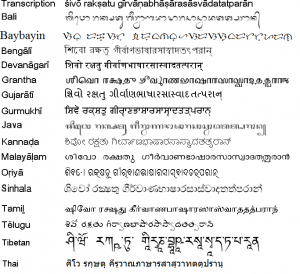Sanskrit Posted by Nitin Kumar on Dec 27, 2011 in Hindi Language
This is the one language which really need some introduction (परिचय). But why, is it anyhow related to Hindi ? and, the answer is, yes!
Sansksrit (संस्कृतम् , Hindi – संस्कृत), like Greek & Latin to Europe and all the western world, is to the Indian Sub-Continent (भारतीय उपमहाद्वीप) and South East Asia. It is the mother (माँ) of Hindi language, the most widely spoken language along with English in India as well as most of the other widely spoken languages in India, Nepal, Pakistan, Bangladesh, Sri Lanka, Thailand etc. It is one of the scheduled language (भाषा) of India.
Most of ancient Indian texts like technical, medical, religious, astronomical, literature (साहित्य) were composed. In ancient times, it was called the language of nobles. It was oral language since Vedic period but later it was written by the regional script of use, like Brahmi script in the North and Kannada or Telugu script in South India. Later. But, ancient or medieval work in Sanskrit might be available in various other scripts like Tibetan, Java, Bali and so on. Later in 17th century, it was written in Devanagari script (लिपि) which is also used for Hindi and other Indian languages. It itself came from Vedic Sanskrit in which many Hinduism sacred (पवित्र, पूज्य) scriptures were written.
Sanskrit is one of the ancient (प्राचीन) language in the Indo – European language group (समूह) and belong to the same era when Greek and Latin were flourishing. It also shares characteristic (विशेषता) sound changes with the the Slavic, Baltic languages and Greek.
The numbers from one to ten which show you how much the sounds matches with other European languages.
1. éka
2. dva
3. tri
4. catúr
5. páñcan
6. ṣáṣ
7. saptán
8. aṣṭá
9. návan
10. dáśan
Linguistically, it is a highly inflected language with three grammatical genders (masculine, feminine, neuter) and three numbers (singular, plural, dual). It has eight cases: nominative, vocative, accusative, instrumental, dative, ablative, genitive, and locative. Sanskrit pronouns are declined for case, number, and gender. The pronominal declension also applies to a some adjectives. Many pronouns have alternative enclitic forms.
Though it has attained a disputed status (अवस्था) of being dead language. It is very much alive in Indian vernacular (जनभाषा) as most of the people (लोग) can read it. Student has to take lessons of Sanskrit for at least 4 years in the schools. Also, as most of the Hindus and Buddhist religious (धार्मिक) texts, hymns (भजन) and verse (छंद) are written in it, it is continued to be used as ceremonial (संस्कारिक) purposes. Government (सरकार) and international (अंतरराष्ट्रीय) bodies have been making a constant effort (प्रयास) to keep it alive.

Build vocabulary, practice pronunciation, and more with Transparent Language Online. Available anytime, anywhere, on any device.





Comments:
vivekananda:
Can you start sanskrit lesson on line as you are doing with Hindi Blog?
Vivekananda
Nitin Kumar:
@vivekananda Dear Vivekananda, did you mean Sanskrit lesson in this blog or somewhere else?